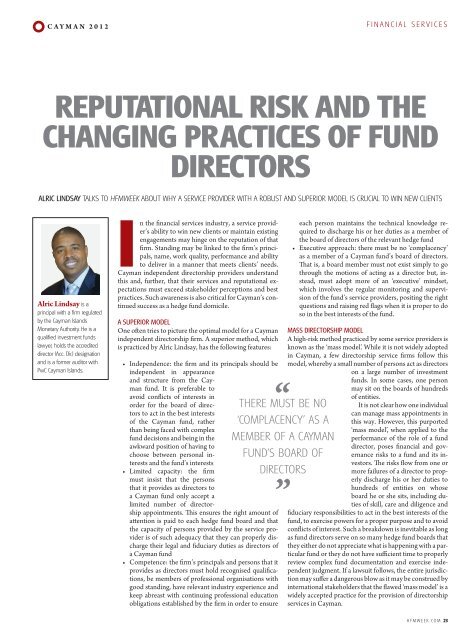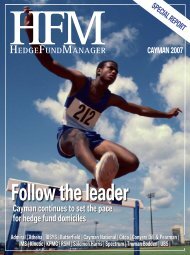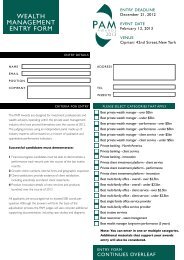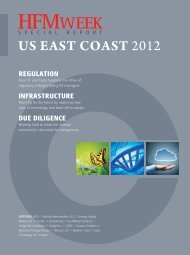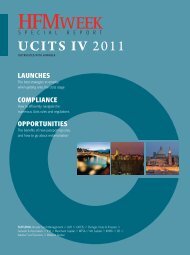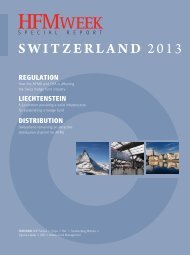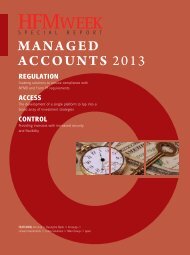CAYMAN 2012 - HFMWeek
CAYMAN 2012 - HFMWeek
CAYMAN 2012 - HFMWeek
- No tags were found...
You also want an ePaper? Increase the reach of your titles
YUMPU automatically turns print PDFs into web optimized ePapers that Google loves.
<strong>CAYMAN</strong> <strong>2012</strong><br />
FINANCIAL SERVICES<br />
REPUTATIONAL RISK AND THE<br />
CHANGING PRACTICES OF FUND<br />
DIRECTORS<br />
ALRIC LINDSAY TALKS TO HFMWEEK ABOUT WHY A SERVICE PROVIDER WITH A ROBUST AND SUPERIOR MODEL IS CRUCIAL TO WIN NEW CLIENTS<br />
Alric Lindsay is a<br />
principal with a firm regulated<br />
by the Cayman Islands<br />
Monetary Authority. He is a<br />
qualified investment funds<br />
lawyer, holds the accredited<br />
director (Acc. Dir.) designation<br />
and is a former auditor with<br />
PwC Cayman Islands.<br />
In the financial services industry, a service provider’s<br />
ability to win new clients or maintain existing<br />
engagements may hinge on the reputation of that<br />
firm. Standing may be linked to the firm’s principals,<br />
name, work quality, performance and ability<br />
to deliver in a manner that meets clients’ needs.<br />
Cayman independent directorship providers understand<br />
this and, further, that their services and reputational expectations<br />
must exceed stakeholder perceptions and best<br />
practices. Such awareness is also critical for Cayman’s continued<br />
success as a hedge fund domicile.<br />
A SUPERIOR MODEL<br />
One often tries to picture the optimal model for a Cayman<br />
independent directorship firm. A superior method, which<br />
is practiced by Alric Lindsay, has the following features:<br />
• Independence: the firm and its principals should be<br />
independent in appearance<br />
and structure from the Cayman<br />
fund. It is preferable to<br />
avoid conflicts of interests in<br />
order for the board of directors<br />
to act in the best interests<br />
of the Cayman fund, rather<br />
than being faced with complex<br />
fund decisions and being in the<br />
awkward position of having to<br />
choose between personal interests<br />
and the fund’s interests<br />
• Limited capacity: the firm<br />
must insist that the persons<br />
that it provides as directors to<br />
a Cayman fund only accept a<br />
limited number of directorship<br />
appointments. This ensures the right amount of<br />
attention is paid to each hedge fund board and that<br />
the capacity of persons provided by the service provider<br />
is of such adequacy that they can properly discharge<br />
their legal and fiduciary duties as directors of<br />
a Cayman fund<br />
• Competence: the firm’s principals and persons that it<br />
provides as directors must hold recognised qualifications,<br />
be members of professional organisations with<br />
good standing, have relevant industry experience and<br />
keep abreast with continuing professional education<br />
obligations established by the firm in order to ensure<br />
THERE MUST BE NO<br />
‘COMPLACENCY’ AS A<br />
MEMBER OF A <strong>CAYMAN</strong><br />
FUND’S BOARD OF<br />
DIRECTORS<br />
”<br />
each person maintains the technical knowledge required<br />
to discharge his or her duties as a member of<br />
the board of directors of the relevant hedge fund<br />
• Executive approach: there must be no ‘complacency’<br />
as a member of a Cayman fund’s board of directors.<br />
That is, a board member must not exist simply to go<br />
through the motions of acting as a director but, instead,<br />
must adopt more of an ‘executive’ mindset,<br />
which involves the regular monitoring and supervision<br />
of the fund’s service providers, positing the right<br />
questions and raising red flags when it is proper to do<br />
so in the best interests of the fund.<br />
MASS DIRECTORSHIP MODEL<br />
A high-risk method practiced by some service providers is<br />
known as the ‘mass model’. While it is not widely adopted<br />
in Cayman, a few directorship service firms follow this<br />
model, whereby a small number of persons act as directors<br />
on a large number of investment<br />
funds. In some cases, one person<br />
may sit on the boards of hundreds<br />
of entities.<br />
It is not clear how one individual<br />
can manage mass appointments in<br />
this way. However, this purported<br />
‘mass model’, when applied to the<br />
performance of the role of a fund<br />
director, poses financial and governance<br />
risks to a fund and its investors.<br />
The risks flow from one or<br />
more failures of a director to properly<br />
discharge his or her duties to<br />
hundreds of entities on whose<br />
board he or she sits, including duties<br />
of skill, care and diligence and<br />
fiduciary responsibilities to act in the best interests of the<br />
fund, to exercise powers for a proper purpose and to avoid<br />
conflicts of interest. Such a breakdown is inevitable as long<br />
as fund directors serve on so many hedge fund boards that<br />
they either do not appreciate what is happening with a particular<br />
fund or they do not have sufficient time to properly<br />
review complex fund documentation and exercise independent<br />
judgment. If a lawsuit follows, the entire jurisdiction<br />
may suffer a dangerous blow as it may be construed by<br />
international stakeholders that the flawed ‘mass model’ is a<br />
widely accepted practice for the provision of directorship<br />
services in Cayman.<br />
HFMWEEK.COM 23


